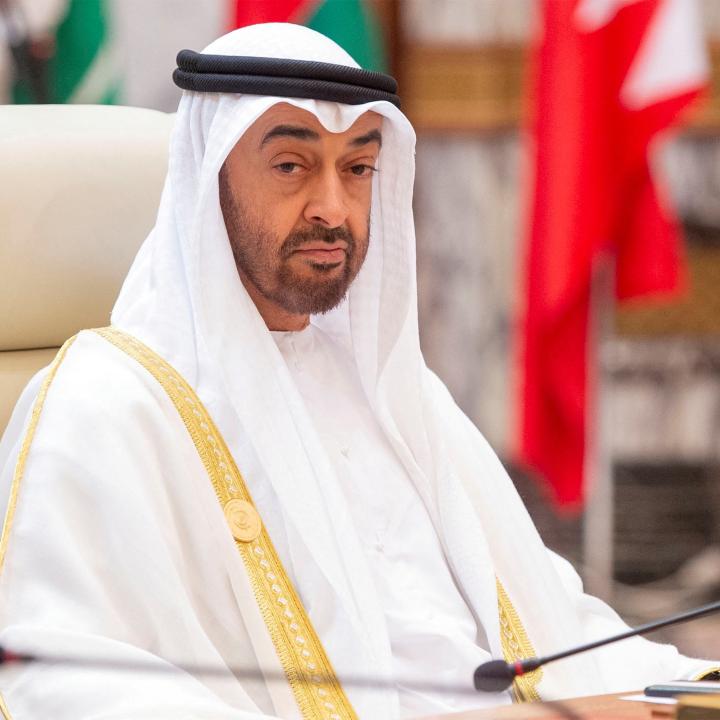
- Policy Analysis
- Policy Alert
UAE President Appoints Son as Crown Prince

A series of rapid announcements has indicated the Emirati leader’s vision for the future of Abu Dhabi and the rest of the UAE.
When President Khalifa bin Zayed of the United Arab Emirates died last May, the country’s crown prince at the time—his half-brother Muhammad bin Zayed, aka MbZ—officially succeeded him as both president of the federation and ruler of Abu Dhabi, its lead emirate in terms of land area and, crucially, oil wealth. In reality, MbZ had been doing both jobs for the previous ten years because of Khalifa’s poor health. Since then, the role of heir apparent in Abu Dhabi (and, by implication, the UAE) lay vacant until March 29, when MbZ announced several key changes:
- His eldest son, Khalid bin Muhammad, was named crown prince of Abu Dhabi.
- MbZ’s brother, Mansour bin Zayed, was named vice president of the UAE. He will serve alongside existing vice president Muhammad bin Rashid, the ruler of Dubai.
- Two other brothers—national security advisors Tahnoun bin Zayed and Hazza bin Zayed—have been named deputy rulers of Abu Dhabi.
On its face, Khalid’s appointment seemingly switches the UAE’s succession system from brother-to-brother to father-to-son. The changes also give new roles to the Bani Fatima—that is, MbZ and his five full brothers, whose mother, Fatima, was the favorite wife of Sheikh Zayed, the UAE’s founder. (Zayed had thirteen other sons and many daughters.)
At the same time, however, the move may spur speculation about how the country will handle succession if MbZ (age 62) were to die or become incapacitated sooner than expected. His father lived to 89, but his brother Khalifa stepped back from active involvement in government at 66.
In any case, expectations of Khalid’s appointment had been rising for months. The Gulf States Newsletter carried a profile of him in January titled “Khalid bin Muhammad’s Rising Star in Abu Dhabi.” Interestingly, the same edition noted that Tahnoun “remains another possible appointee as heir,” but he seems to have been largely sidelined in the latest appointments.
Another potentially significant appointment is that of Mansour, best known abroad as owner of the Manchester City soccer club. Naming him as co-vice president might be interpreted as reducing the influence of the ruler of Dubai, the UAE’s commercial hub and second-largest emirate. Yet Mansour is married to Muhammad bin Rashid’s daughter, so that might not be the case.
All of these somewhat esoteric details will be watched intently in the region and—given the UAE’s tremendous wealth and active diplomacy—the wider world. Among the closest observers will be Israel (which signed the breakthrough Abraham Accords with the UAE in 2020) and the United States (which has a close but sometimes tense relationship with the Emirates).
Simon Henderson is the Baker Fellow and director of the Bernstein Program on Gulf and Energy Policy at The Washington Institute. In 2019, he coedited its succession paper “MbZ and the Future Leadership of the UAE.

